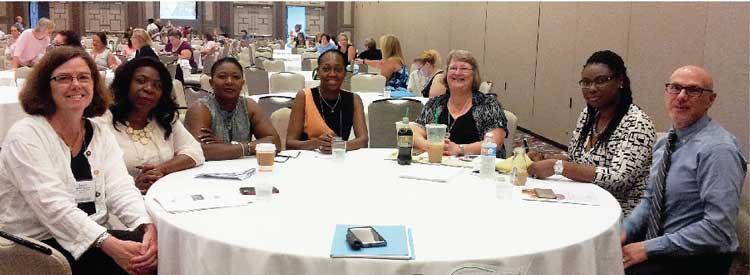Practices for Responding to Dementia Behaviors

We have been very gratified by the response to our new publication, Palliative Care for People with Dementia: Why Comfort Matters, which describes our work with three New York City Nursing Homes (Cobble Hill Health Center, Isabella Geriatric Center, and The New Jewish Home, Manhattan) to implement a palliative approach to the care of people with advanced dementia. As we have discussed in past issues, this approach is based on the groundbreaking model developed by The Beatitudes Campus in Phoenix which, using a comfort approach, identified a number of strategies specifically for people with advanced dementia living in residential settings. Care is based on knowing as much as possible about the individual with dementia, with full recognition that the resident may not be able to verbally articulate their needs, so they may express them in other ways.

From left: Deirdre Downes, Isabella Geriatric Center; Sharon Blake and Maria Bennett, The New Jewish Home, Manhattan; Karen Harper, Isabella Geriatric Center; Karen Mitchell, Comfort Matters®; Liza Long and Robert Herel, Cobble Hill Health Center.
We have learned that when we see "behavior," we should instead label it "distress." Typically, the term "behavior" is used to describe what someone with dementia is doing that is disconcerting or disturbing in ways we don’t understand. "Behaviors" may include calling out, taking someone else’s food, or hitting a staff member during bathing. Why does this matter so much? When we think "behavior," there is a tendency (however unconsciously) to assume the person has control over something he or she should stop. It is often hard in the moment to understand that the person doesn’t "know" why they are behaving in such a way. Our first response is often directed to stopping the behavior. When we think "distress," however, we are much more likely to think that something is happening to the person that is causing him or her to feel badly. Then we are more likely to focus on getting to the root of the problem and relieving the person’s discomfort. Beatitudes offers specific practice improvements to address the needs underlying behaviors rather than the behaviors themselves.
All three of our partner homes have been working to implement these practices on their dementia units, and are currently working to achieve accreditation by Beatitudes (through their Comfort Matters® program) later this year. Our new publication is intended to share what we have learned with other homes, in hopes that they too will be inspired and assisted in adopting these practices. We have sent copies out to the more than 500 homes in New York State, and another 1,500 copies to individuals and provider and advocacy organizations in the metropolitan area, as well as throughout the country. Copies can also be downloaded free of charge at caringkindnyc.org/palliativecare.
As we have focused on this work over the past few years, we and representatives from our partner homes have made presentations both locally and nationally, including at the annual meetings of LeadingAge, the American Society on Aging, the National Consumer Voice, the Center to Advance Palliative Care, and, most recently, the Pioneer Network at their meeting in New Orleans this past August. Above is a photograph from that event.
Going forward, we have established a Palliative Care Advisory Group, composed primarily of clinicians with expertise in long-term and palliative care, to provide us with ongoing support and assistance in advancing the adoption of these principles and practices. Representatives from all three of our partner homes, and from the three hospice programs with which they work (Calvary Hospital Hospice, MJHS Hospice and Palliative Care, and Visiting Nurse Service of New York Hospice and Palliative Care), will also be participating.
